- Home
- Marcia Talley
A Quiet Death
A Quiet Death Read online
Recent Titles by Marcia Talley
The Hannah Ives Mysteries Series
SING IT TO HER BONES
UNBREATHED MEMORIES
OCCASION OF REVENGE
IN DEATH’S SHADOW
THIS ENEMY TOWN
THROUGH THE DARKNESS
DEAD MAN DANCING *
WITHOUT A GRAVE *
ALL THINGS UNDYING *
A QUIET DEATH *
* available from Severn House
A QUIET DEATH
A Hannah Ives Novel
Marcia Talley
This ebook is copyright material and must not be copied, reproduced, transferred, distributed, leased, licensed or publicly performed or used in any way except as specifically permitted in writing by the publishers, as allowed under the terms and conditions under which it was purchased or as strictly permitted by applicable copyright law. Any unauthorised distribution or use of this text may be a direct infringement of the author's and publisher's rights and those responsible may be liable in law accordingly.
First world edition published 2011
in Great Britain and in the USA by
SEVERN HOUSE PUBLISHERS LTD of
9–15 High Street, Sutton, Surrey, England, SM1 1DF.
Copyright © 2011 by Marcia Talley.
All rights reserved.
The moral right of the author has been asserted.
British Library Cataloguing in Publication Data
Talley, Marcia Dutton, 1943–
A quiet death. – (The Hannah Ives mysteries series)
1. Ives, Hannah (Fictitious character) – Fiction.
2. Railroad accidents – Fiction. 3. Love-letters – Fiction.
4. Maryland – Fiction. 5. Detective and mystery stories.
I. Title II. Series
813.6-dc22
ISBN-13: 978-1-78010-076-0 (ePub)
ISBN-13: 978-0-7278-8041-3 (cased)
ISBN-13: 978-1-84751-350-2 (trade paper)
Except where actual historical events and characters are being described for the storyline of this novel, all situations in this publication are fictitious and any resemblance to living persons is purely coincidental.
This ebook produced by
Palimpsest Book Production Limited,
Falkirk, Stirlingshire, Scotland.
Acknowledgements
On June 22, 2009, Metro train no. 112 pulled out of Takoma Station, Washington, DC, heading for Fort Totten, Maryland. At 5:02 p.m., it plowed into the rear of another train standing in the Fort Totten station, killing nine people, making it the deadliest crash in DC Metro history. I’ve never been in a train wreck, thank goodness, but wish to acknowledge the eyewitness accounts told by survivors, rescue workers, and good Samaritans in the days following the disaster that helped inform Hannah’s story.
In addition, I want to thank:
My husband, Barry Talley, who puts up with my absences, both physical and mental, whenever I get lost in my writing.
My daughters, Laura Geyer for ‘John Chandler,’ and Sarah Glass for the broken arm, and for being a Mawrter, too.
Rick ‘Ike’ Iacangelo, DCFD Engine Co. 13, #2 Platoon, wagon driver, retired.
Capt. Donald Jensen, MC, USN, aka ‘Mr X-ray.’
My Sisters in Grime, including Carol Chase, Terri Ryburn, Toni Tucker, Laurel Anderson, Jo Mink, Joan Hubbs, Kathi Davis, Vicki Hill, Peg Shea, and Carolyn Paullin, who will know why.
My amazing editor, Amanda Stewart, my can-do publicist, Michelle Duff, Piers Tilbury and Claire Caswell, who design the most eye-catching book covers ever, Edwin Buckhalter, and everyone else at Severn House who makes it such an incredibly supportive place for a mystery writer to be.
And, once again, my fellow travelers at various stations on the road to publication, the Annapolis Writers Group: Ray Flynt, Lynda Hill, Mary Ellen Hughes, Debbi Mack, Sherriel Mattingley, and Bonnie Settle.
And to Kate Charles and Deborah Crombie – Plot fest forever!
For reasons of national security, the Library of Congress Office of Security and Emergency Preparedness has requested that I alter certain details concerning security screening pro-cedures at Library of Congress buildings within the District of Columbia. Not really, but if I got it wrong, that’s my story.
At three and twenty I am left alone, and what more can we be at seventy? It is true, I am young enough to begin again, but with whom can I retrace the laughing part of life? It is odd how few of my friends have died a quiet death; I mean in their beds. But a quiet life is of more consequence.
Lord Byron (George Gordon),
Letter to James Wedderburn Webster, August 24, 1811
ONE
Once upon a time, I worked in Washington, DC.
Then, in an extreme case of downsizing, I lost my job to the recession and a breast to cancer – both in the same year.
Now, I was back, threading my way through a knot of entrepreneurs at the McPherson Square Metro station – a sad-eyed Korean girl selling roses, a ukulele-playing panhandler, and some guy pimping Krispy Kremes – and it occurred to me that I didn’t miss the job or the commute one little bit. The breast? Well, that was another matter. Reconstructive surgery had worked its magic – my husband thinks I look hot in my red and white tankini – but the fact remained that Sports Illustrated magazine wouldn’t be featuring me in their annual swimsuit issue any time soon.
A swimsuit, I wish! What better attire for sweltering in a Washington, DC subway station on a busy Tuesday afternoon? For three thirty, the platform was unexpectedly crammed. Tourists drooped, still jabbering about their tour of the nearby White House. School kids sagged under the weight of their backpacks. Other commuters in sweat-stained cotton shirts loafed about, mopping their collective brows, enjoying a temporary respite in the underground tunnel from the relentless triple-digit temperatures. An early-September heatwave had swept over the eastern seaboard, breaking all previous records. When I left Annapolis earlier that morning, the thermometer on my shaded patio had already read eighty-nine degrees. Now, even in the air-conditioned station, I could feel sweat beading along my hairline and trickling down between my breasts.
A blue line train slid into the station and carried some of the wilted passengers away, but by the time I pushed my way on to the lead car of an orange line train heading for New Carrollton, and the parking garage where I’d left my Volvo, it was still standing room only, so I planted my heels firmly on the floor and grabbed on to a pole as the train picked up speed.
At Metro Center, more people got on than off, squeezing damp bodies, bags and backpacks into the overcrowded car, and squashing me against a guy who, according to his Hoyas T-shirt, was a student at Georgetown University. As my hip ground into his, I readjusted my shoulder bag so it hung in front of me – pickpockets were not unknown on the DC Metro system – and looked around somewhat desperately for a seat.
Several stops later, at L’Enfant Plaza, I was eyeing a vacant seat toward the front of the car, when a teenager muscled by, tethered to an iPod Nano by white ear buds screwed in tight, a scratchy boom-chica-boom-chica-boom leaking out of his ears. He beat me to it. I scowled in his general direction, and at the sign on the bulkhead behind his seat that stated in bold, black letters: ‘Priority Seating: Reserved for the Elderly and Handicapped,’ not knowing whether to feel outraged by his discourtesy, or secretly pleased that I didn’t appear to be all that elderly.
At Eastern Market, I plopped myself down gratefully at the rear of the car next to a young businessman cradling a shopping bag in his arms like a newborn, closed my eyes and inventoried the contents of my freezer, trying to decide what I might throw together for dinner. When the train popped out of the underground tunnel into the blazing sunlight after the Stadium Armory st
ation, I used my iPhone to call my husband, who was probably still grading papers in his office at the Naval Academy.
Paul answered right away. ‘Hannah.’
‘Caller ID never ceases to amaze me.’
‘How was the fashion show?’ Paul was referring to the fund-raising luncheon I’d just attended, sponsored by a prominent DC law firm in partnership with Nordstrom in order to raise money for breast cancer research.
‘Gorgeous. There was this Eileen Fisher beaded wool cardigan. Only three hundred bucks. You’re lucky I left my checkbook at home, Mr Ives.’
‘How can you seriously look at sweaters in all this heat, Hannah?’
‘You forget. I’m a trained professional.’ I shifted the phone from my left ear to my right and relaxed into the vinyl upholstery, deliciously cool against the tepid dampness of my favorite knee-length, black and white paisley dress. I adored that dress, purchased at a boutique on Fosse Street while on vacation in Dartmouth, England, the previous summer.
‘Crossing Eye Street was a hazard, no surprise. You know those cute little Prada slingbacks I slipped into this morning?’ I asked, knowing he wouldn’t. ‘I thought I was going to lose them, sucked into the tarmac like the La Brea Tar Pits, not to be rediscovered until late in the thirty-first century.’
On the other end of the line, Paul chuckled. ‘I didn’t jog today either.’
‘Sensible lad.’ I checked my watch. ‘Look, I’m running late. Would you mind swinging by Whole Foods on your way home from the Academy? Pick up something interesting for dinner?’
‘Not exactly on my way, is it, but I’m happy to oblige. What are you in the mood for?’
‘Anything but poultry,’ I said, remembering the chicken salad I’d had for lunch that had all the taste and consistency of a minced dishrag.
‘Cuisine?’
‘Anything but fried.’ I mentally reviewed the items on offer at the numerous prepared foods bars of the upscale supermarket, factored in the heat of the day and concluded, ‘Salads! That’s the ticket.’
‘Will do.’
‘And wine. I could use some right now, in fact. A bottle of Sauvignon Blanc. Well chilled. With a straw.’
‘Hold that thought,’ Paul said, and rang off.
I stared at the screen on my iPhone for a moment, wondering if I had time for a game of Bejeweled, when the guy sitting next to me stirred. ‘You like it?’
I turned to face him. ‘My iPhone, you mean?’
He laid his bundle across his knees. ‘Been thinking about getting one, but I’ve got Verizon.’
‘Apple’s working on that,’ I said, noticing that his shopping bag carried the Julius Garfinkel & Co label, a landmark Washington, DC department store that had gone out of business more than twenty years before. ‘My mother sent me off to college wearing clothes we bought at Garfinkel’s,’ I told him, indicating the bag. ‘Back when dressing for dinner meant something more refined than pushing a tray through a cafeteria line while wearing clean jeans and an Eminem T-shirt.’
‘I know what you mean,’ he said, dark eyes serious under pale, shaggy brows that marched across his forehead like caterpillars. ‘Nobody’s got standards any more. Although I can’t wait to get out of this suit.’ He plucked at his shirt collar, open wide at the neck. His tie, navy blue with minute red and yellow stripes, had already been removed, rolled up and tucked into the breast pocket of his jacket, where it peeked out like a plump sausage. ‘Jesus. If the heat doesn’t break soon, people are going to start going postal. Is it always this hot in September?’
‘Rarely,’ I chuckled. ‘Usually we go straight from summer into winter, skipping the business of fall altogether, except for a few perfectly splendid days in mid-October which make one ridiculously happy to be alive.’ I paused for a moment. ‘Do you sail?’
‘Me?’ He managed a smile. ‘Never. Boats don’t agree with my stomach.’
‘Cruising the Chesapeake Bay in October is one of life’s greatest pleasures. We don’t have a sailboat,’ I added, ‘but my sister-in-law does, and she’s always looking for crew. I provide ballast,’ I said with a grin.
‘How long is this heat supposed to last?’ my seat-mate wanted to know.
I shrugged. ‘Couple of days? Wait a minute.’ While he observed over my shoulder, I tapped the weather app on my iPhone. When the five-day display appeared, I turned the tiny screen in his direction. ‘Looks like we’re back to normal on Friday.’
‘What’s normal?’ my seat-mate asked as he watched the Cheverly station roll by outside the window.
‘Low to mid-seventies,’ I informed the back of his head, which was covered with a tangle of sandy curls.
‘Huh,’ he replied.
The four o’clock Acela Express screamed past on its way north, sucking the air out of our car in one greedy, pneumatic gasp. My seat-mate jumped like he’d been shot, then settled back into his seat and continued staring silently out the window, our deeply intellectual conversation about the weather clearly over. I zoned out, mesmerized by the blur of passing scenery and the comforting chubunk-chubunk-chubunk of the wheels along the tracks.
As we pulled into the station at Landover, my seat-mate stood, tucked his package under his arm, and eased past my legs into the aisle. I thought he was preparing to get off, but when the train rolled out of the station again, he remained standing in the aisle near the door, grasping a metal pole with one hand and his Garfinkel’s shopping bag with the other.
My iPhone peeped. A text message from my daughter, Emily, asking if I’d RUN C’PL TOM. I was mentally rearranging the next day’s schedule so I could drive my grandchildren to school, when a voice from the front of the car screamed, ‘Oh, no!’
Startled, I looked up just in time to see my seat-mate vanish into a cloud of dust, glass, seats and carpeting that rolled up the aisle toward me in an undulating wave – ten feet, five feet, four, three – before sucking me into the undertow.
The squeal of metal against metal, a teeth-rattling jolt. The train rocked once, twice, before settling nose up and tilted to one side with a mournful, metallic groan. For a few moments, there was utter silence.
And then the chaos began.
TWO
What had just happened?
Stunned, I lay on my side in a bed of debris and broken glass and tried to make sense out of it. The train must have hit something. Had we derailed?
Dust filled the air, thick as smoke. I coughed and tried to roll over. Why was I looking up into a cloudless blue sky?
When we left the Landover station there had been no more than a dozen passengers remaining in our car; New Carrollton was the end of the line. Now they all seemed to be crying out:
Help me! Please! My foot’s stuck!
Baby! Where are you, baby? Are you OK?
Jessie! Jessie! Oh my God!
Somebody open the door! Get us out of here!
I eased myself into a crawling position and tried to move toward the nearest exit, but when I pressed my left palm against the carpet, a lightning bolt shot up my arm and across my shoulders, a pain so intense that I fell sideways against what remained of one of the seats, now lying bottom side up, blocking a pair of exit doors. I didn’t have to look to know my left arm was broken, but I inspected it anyway, fearful I’d find bones sticking out through my skin. There was no blood, thank goodness, but my arm was bent in a way Mother Nature never intended: I appeared to have a second wrist midway up my forearm. ‘This can’t be good,’ I muttered, drawing the damaged arm closer to my body.
‘Do you need help, ma’am? I heard you scream.’
I was eye-to-eye with a pair of combat boots that I’d last seen jutting out into the aisle from the seat behind me. I looked up, way up, into the face of their owner, a lanky black man who appeared miraculously uninjured, save for a one-inch gash on his stubbly chin. Sweat glistened on his cheeks, beaded his forehead. He wore a green, tan and gray camouflage uniform, and the Velcro patch on his chest told me he was a staff sergeant.
A second patch over his right pocket said: Boyer. I tried to answer, but dust seemed to be coating my vocal cords. ‘Broken arm,’ I croaked.
‘Can you walk?’
‘I think so.’
Sergeant Boyer bent down, extended his arm. Using my good arm, I grasped his forearm tightly and held on while he stood, pulling me gently to my feet. ‘I’m Will,’ he said. ‘Anybody with you?’
Struggling for balance, my fingers dug into his sleeve while I bent double, coughing until my lungs burned. The sergeant waited me out.
‘There was a guy sitting next to me,’ I wheezed. ‘He was standing up when the train . . .’ My voice trailed off as I took in the condition of the front end of our car. The impact had savagely twisted seats, doors and windows, compressing them into a mountain of wreckage that spanned the entire width of the car.
The dust was beginning to settle when another man staggered out of the debris field, dragging a young woman by the hand. Strands of hair had escaped her bun and hung lifelessly around her face which was bloody and pocked with glass. ‘Get me out of here, baby,’ she wailed as she limped along behind him. One of her shoes had gone missing.
‘The side doors are jammed,’ the man called Baby reported, waving vaguely. ‘And the windows won’t pop out like they’re supposed to. How about the rear door?’
‘I just tried,’ Sergeant Boyer informed him. ‘No joy. You can see that the bulkhead’s collapsed.’
The woman began to wail like a professional mourner. ‘Oh, God, baby, we’re trapped!’ She shook her hand free of his, staggered over to a twisted window and began pounding on the glass with both fists. ‘Help! Help! Get us out of here!’
Sergeant Boyer watched her performance for a second, then grabbed the hem of his uniform jacket and, in one swift move, pulled it off over his head. ‘I guess we’ll have to make an exit, then.’
I watched in awe as he marched on the rear door in his olive green undershirt, solid and determined as a Sherman tank. As he moved, he wrapped the jacket around a tattoo on his forearm that said, in gothic script, Psalm XXIII. ‘Stand back,’ he ordered.

 Unbreathed Memories
Unbreathed Memories Tangled Roots
Tangled Roots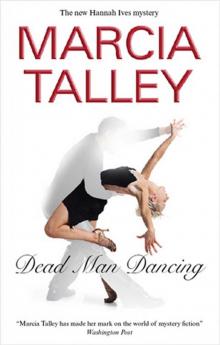 Dead Man Dancing
Dead Man Dancing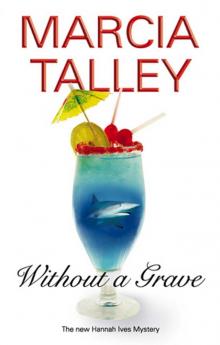 Without a Grave
Without a Grave Sing It to Her Bones
Sing It to Her Bones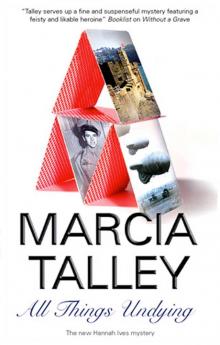 All Things Undying
All Things Undying Naked Came the Phoenix
Naked Came the Phoenix Daughter of Ashes
Daughter of Ashes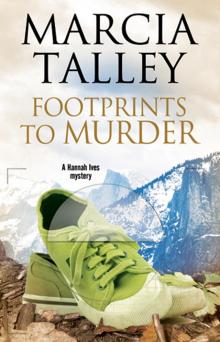 Footprints to Murder
Footprints to Murder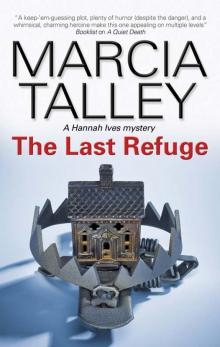 The Last Refuge
The Last Refuge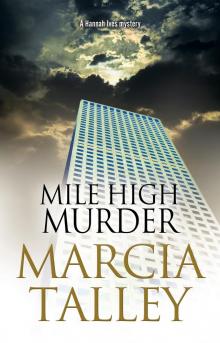 Mile High Murder
Mile High Murder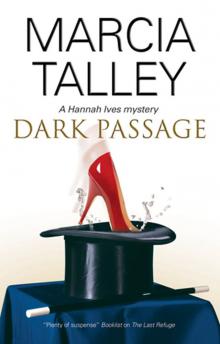 Dark Passage
Dark Passage This Enemy Town
This Enemy Town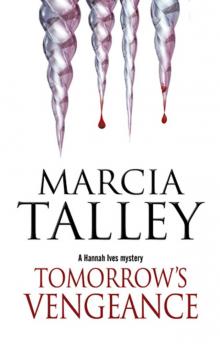 Tomorrow's Vengeance
Tomorrow's Vengeance Occasion of Revenge
Occasion of Revenge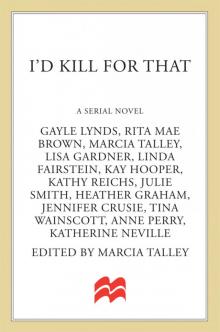 I'd Kill For That
I'd Kill For That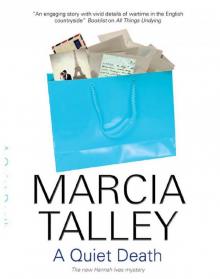 A Quiet Death
A Quiet Death